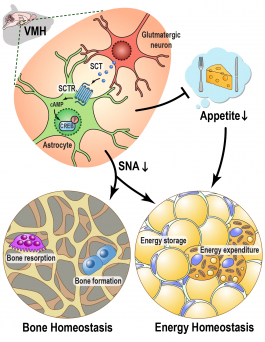
A team of researchers from The University of Hong Kong (HKU) has made a significant breakthrough in understanding how energy metabolism and bone homeostasis are regulated in mice, which could lead to novel treatments for obesity and osteoporosis. The study, led by Professor Billy CHOW from the School of Biological Sciences (SBS), Faculty of Science, Professor Kelvin YEUNG from the School of Clinical Medicine, LKS Faculty of Medicine, and Professor Will Wei QIAO from the Faculty of Dentistry, along with their colleagues, has been published in the top journal Nature Communications, with Dr Fengwei ZHANG from SBS as the first author.
In their pioneering research, the team discover that the hormone secretin, found within the ventromedial hypothalamus (VMH) of the brain, plays a vital role in controlling both energy balance and bone density. This finding challenges the traditional view that secretin’s primary function is in the digestive system, showcasing its importance in the central nervous system.
Using advanced genetic techniques, the researchers manipulated secretin signalling in mice and observed remarkable outcome. They found that disruptions to secretin pathways in the VMH led to increased appetite, metabolic dysfunctions, and significant bone density loss. Conversely, enhancing secretin signals in the same area increased bone mass without affecting body weight or appetite.
‘Our study opens new doors to treating metabolic and bone diseases. The ability to control appetite and bone density through the brain has significant implications for tackling obesity and osteoporosis,’ notes principal investigator Professor Chow.
Looking forward, this research provides new ideas for developing innovative therapies targeting the brain to regulate body metabolism and bone health. The team plans to further investigate the applicability of these findings to human physiology and potential drug development.
The University of Hong Kong is known for its interdisciplinary approach, and this research represents a close collaboration between the fields of neuroscience, endocrinology, and orthopedics. Details can be found at Nature Communications under the title ‘Secretin-dependent signals in the ventromedial hypothalamus regulate energy metabolism and bone homeostasis in mice’.
The journal paper can be accessed here:
